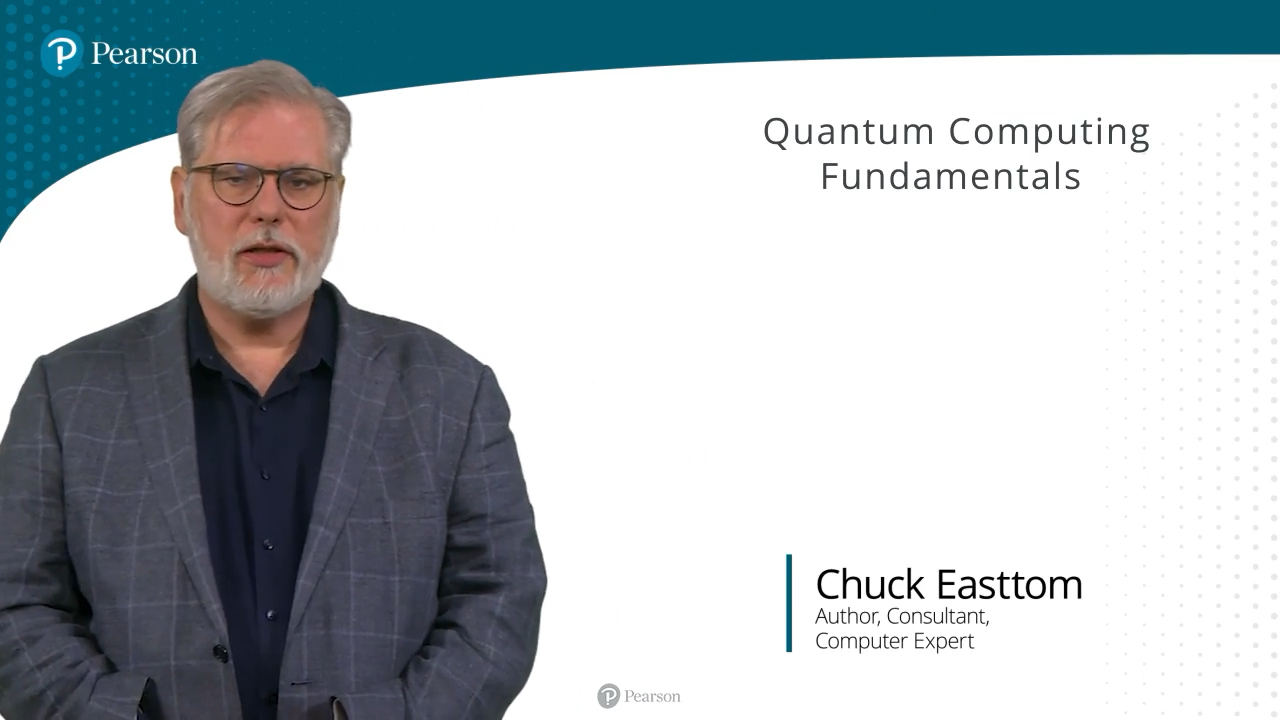Quantum Computing Fundamentals LiveLessons
- By William Easttom
- Published Feb 16, 2023 by Addison-Wesley Professional.
Online Video
- Your Price: $279.99
- List Price: $349.99
- About this video
Video accessible from your Account page after purchase.
Register your product to gain access to bonus material or receive a coupon.
Description
- Copyright 2023
- Edition: 1st
- Online Video
- ISBN-10: 0-13-787249-6
- ISBN-13: 978-0-13-787249-7
An 8-Hour Introduction to Quantum Computing from Dr. Chuck Easttom
Quantum computing is fast approaching a practical reality. QC impacts the future of computing as well as security issues. QC will render current asymmetric cryptographic methods insecure, and that requires QC-resistant algorithms. IT personnel and cybersecurity professionals must have at least a basic conceptual understanding of quantum computing. This video course
- Clearly explains core concepts, terminology, and techniques
- Covers the foundational physics, math, and information theory you need
- Provides hands-on practice with quantum programming
This is the perfect beginner's guide for anyone interested in a quantum computing career.
Dr. Chuck Easttom brings together complete coverage of basic quantum computing concepts, terminology, and issues, along with key skills to get you started.
This dynamic video course draws on 30+ years of experience from Dr. Easttom as a computer science instructor, consultant, and researcher. Dr. Easttom demystifies the fields underlying technical concepts and math, shows how quantum computing systems are designed and built, explains their implications for cybersecurity, and previews advances in quantum-resistant cryptography. This video course is designed to clearly and simply introduce two of today's leading quantum programming languages, Microsoft Q# and QASM, and guides you through sample projects. Throughout, tests, projects, and review questions help you deepen and apply your knowledge.
Whether you're a student, professional, or manager, this video course will prepare you for the quantum computing revolutionand expand your career options, too.
- Master the linear algebra and other mathematical skills you'll need
- Explore key physics ideas, such as quantum states and uncertainty
- Review data structures, algorithms, and computing complexity
- Work with probability and set theory in quantum computing
- Familiarize yourself with basic quantum theory and formulae
- Understand quantum entanglement and quantum key distribution
- Discover how quantum computers are architected and built
- Explore several leading quantum algorithms
- Compare quantum and conventional asymmetric algorithms
- See how quantum computing might break traditional cryptography
- Discover several approaches to quantum-resistant cryptography
- Start coding with Q#, Microsoft's quantum programming language
- Simulate quantum gates and algorithms with QASM
If you prefer a multimodal approach to learning, check out the Quantum Computing Fundamentals book by Chuck Easttom!
Sample Content
Table of Contents
Lesson 1: Linear Algebra for Quantum Computing
Learning objectives
1.1 Linear Algebra Basics
1.2 Matrix Operations
1.3 Vectors and Vector Spaces
1.4 Vector Operations
1.5 Eigenvalues and Eigenvectors
1.6 Additional Math Topics
Lesson 2: Physics for Quantum Computing
Learning objectives
2.1 Historical Developments
2.2 Quantum Physics Basics
2.3 Entanglement
2.4 More with Quantum Physics
Lesson 3: Quantum Computing
Learning objectives
3.1 Logical Qubits
3.2 Quantum Logic Gates
3.3 Quantum Circuits
3.4 Physical Qubits
3.5 Quantum Computing Challenges
3.6 More with Quantum Computers
Lesson 4: Quantum Algorithms
Learning objectives
4.1 Deutsch's Algorithm
4.2 Grover's Algorithm
4.3 Deutsch-Jozsa Algorithm
4.4 Shor's Algorithm
Lesson 5: Quantum Computing and Cryptography
Learning objectives
5.1 Current Asymmetric Cryptography
5.2 Lattice Based Cryptography
5.3 Response to Quantum Threats
5.4 Multi-Variate Cryptography
5.5 Other Approaches
Lesson 6: Quantum Programming
Learning objectives
6.1 QASM Basics
6.2 QASM Examples
6.3 Grover's Algorithm
6.4 Deutsch's Algorithm
6.5 Adder Algorithm
6.6 Python and Quantum Programming
6.7 Q# Overview
6.8 Quantum Machine Learning
Summary
More Information

